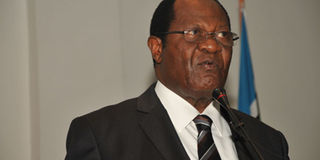I can’t return as Chief Justice even if AG wins appeal - Odoki

What you need to know:
The post. Justice Odoki says he was not interested in his old job but it was conferred on him by the JSC following a request by the President.
KAMPALA.
Justice Benjamin Odoki has said he will not take up the position of Chief Justice even if the Attorney General (AG), Mr Peter Nyombi, successfully appeals against the recent ruling of the Constitutional Court that rejected his re-appointment.
“I can’t refuse the AG to appeal the majority decision. He may have constitutional issues that he wants the Supreme Court to address,” Justice Odoki said in an exclusive interview yesterday.
“However, even if he successfully appeals, I will not come back as Chief Justice and you know it. I am not interested and I was never interested, this was just conferred on me,” Justice Odoki explained.
Justice Odoki, who headed the team that crafted the 1995 Constitution, said the bashing he has endured since his re-appointment saga started makes him think of handing over immediately.
Justice Odoki, whose re-appointment as Chief Justice was annulled by the Constitutional Court last week, also denied being responsible for the country’s absence of a Chief Justice for the past one year.
He explained that the Judicial Service Commission (JSC) and the President were responsible for the quandary, saying he is already retired.
His remarks come a few days after the AG had kick-started the appeal process aimed at challenging the Constitutional Court decision to quash his re-appointment as Chief Justice.
Justice Odoki, who officially retired in June last year upon clocking the mandatory retirement age of 70, for the first time came out to explain the genesis of the re-appointment saga.
He explained that upon retirement last year, given the few judges at the Supreme Court who were about four in number, the appointing authority (the President) asked that the four retired justices; Christine Kitumba, Galdino Okello, John Wilson Tsekooko and himself to return in “acting capacity” and fill the gap but on a two-year contract.
He added that it is upon this background that the President asked him to be their head for the two years as the search for the new and substantive Chief Justice continued.
He denied having been personally contacted prior to the re-appointment as Chief Justice saying the communication was between the JSC and the President and that he was not party to it.
“It was a transition moment when I and three other retired Justices of the Supreme Court were recalled back to the Bench given the few remaining justices at the Supreme Court. We agreed and the President asked me to become their head as the search for the new Chief Justice ensued.
The re-appointment process was not even concluded as I was not given any appointment letter to that effect,” Justice Odoki said.
On August 4, in a majority decision of four to one by the Constitutional Court judges held that the President erred in re-appointing retired Justice Odoki as Chief Justice.
The justices held that there is no provision in the Constitution that provides for the re-appointment of a retired Chief Justice.
Justice Rubby Aweri Opio, who wrote a dissenting judgment, held that Justice Odoki was eligible for re-appointment as Chief Justice under Article 253 that provides for re-appointment of civil servants upon retirement and that Odoki was not an exception of this provision.
Justice Aweri elaborated that he would have queried the re-appointment of Justice Odoki if it was done under suspicious circumstances like promoting selfish interests of the President.
The petition arose in August last year after President Museveni in a July 9, 2013 letter, wrote to chairman of the JSC, Justice James Ogoola, directing that Justice Odoki be given a two-year contract in order to maximise the services of the judicial human resource.
However, the re-appointment of Justice Odoki was successfully challenged in the Constitutional Court by Western Youth Member of Parliament Gerald Karuhanga on grounds that it was unconstitutional since he had clocked the mandatory constitutional retirement age of 70 and was ineligible for the post that he had held for 12 years.




